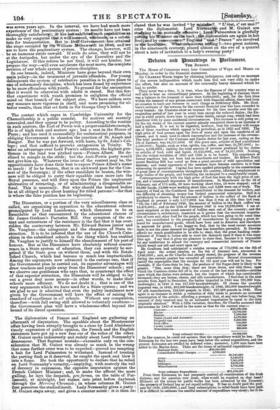The diplomatists of France and England are gathering an aftermath
of disputation. The squabble about the Montpensier affair having been abruptly brought to a close by Lord Aberdeen's timely expression of public opinion, the French and the English statesmen have got up a new fuss out of the relics of the other. M. Guizot spoke indiscreetly and rudely about Lord Normanby's demeanour. That flagrant mistake—excusable only on the con- sideration that M. Guizot was already so much in the wrong that some further error was to be expected—proved too tempting a bait for Lord Palmerston to withstand. Instead of treating the parting flash as it deserved, he caught the spark and blew it into a flame. He took the opportunity to declare that he relied on Lord Normanby's veracity,—implying, with scarcely the veil of decency in expression, the opposite imputation against the French Cabinet Minister ; and, to make the affront the more galling, he lays the despatch, pro forma, on the table of Par- liament, at midnight, but rushes into print before daybreak through the Morning Chronic* ; in whose columns M. Guizot first perceives the studiedinsult. Lady Norm anby gives a party : M. Guizot stays away, and gives a counter soirée: it is then de- dared that he was invited "by raistaiteaP "L' etat, c' est moi !" cries the diplomatist. Lord Nbrmantip and M. Guizot are studying to be mutually offensive;. Loth i Palmerston is gleefully patting his -Minister on the back ;.:the diplomatists are again in hot feud; and by consequence " England 'and," France" are involved in- the hostilities: What calamitous trifling 1—two great nations, in the nineteenth century placed almost on the eve of a quarrel about a note of invitation to a lady's evening party !


























 Previous page
Previous page